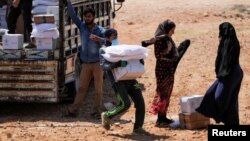Not long after the September 11, 2001, terrorist attack on the United States, United Nations Security Council passed numerous Resolution meant to hinder terrorist groups in various ways, including by freezing their assets to deny them the ability to raise and transfer funds. Within the following two decades, no fewer than 14 terrorist-thwarting sanctions regimes were put in place.
But there were unintended consequences, including the hindering of humanitarian aid efforts. That is why, two years ago, the Security Council passed a resolution creating a carve-out for humanitarian efforts in all UN sanctions regimes, thus balancing counter-terrorism measures with the need to facilitate humanitarian assistance by providing predictability to aid and humanitarian organizations. On December 6, the Council voted unanimously to extend the carveout indefinitely.
“There are hundreds of humanitarian providers – individuals and entities alike – currently active across 30 countries where [sanctioned] individuals and entities are active,” said Robert Wood, U.S. Alternative Representative for Special Political Affairs at the U.N.
“Ten of those countries host major humanitarian operations – operations that deliver in exceptionally challenging contexts like Nigeria, Afghanistan, Syria, and the Sahel.”
“For nearly 100 million people … humanitarian assistance can mean the difference between life and death,” said Ambassador Wood.
“We also recognize that humanitarians, donors, banks, and suppliers serving these people – the ones putting their lives on the line to deliver food, aid, and medicine – deserve the highest degree of legal clarity, predictability, and protection. And that requires ensuring that sanctions don’t impede the work of legitimate, impartial humanitarian aid providers.”
“This resolution helps remove that particular barrier. And it does so without lifting the burden on sanctioned actors,” said Ambassador Wood.
“Since the adoption of Resolution 2664, humanitarians covered by it have taken their obligations seriously. They have worked diligently to prevent aid diversion and minimize any incidental benefits to sanctioned actors,” said Ambassador Wood.
“And they have taken extensive measures to implement robust due diligence and risk mitigation processes to ensure that aid reaches those in need.”
“As the world’s leading humanitarian donor, the United States recognizes our responsibility to do everything in our power to reach the world’s most vulnerable,” said Ambassador Wood. “With the support of co-pen Switzerland, the United States is proud to indefinitely extend the applicability of this carveout.”






